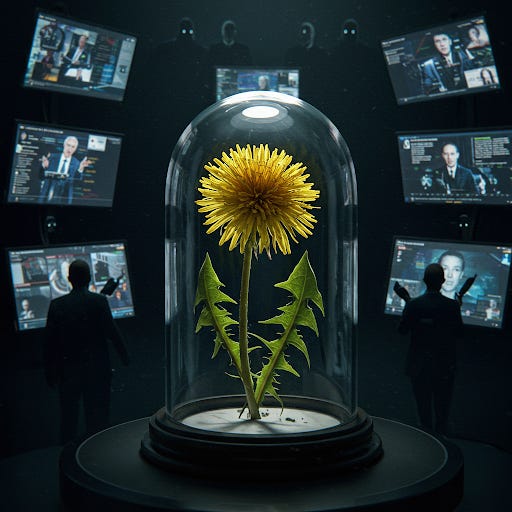#Bristol - The Great Societal Softening: Are We Breeding a Generation of Distractable Dandelions (And Are We All Just Faking It, While the Elites Pick Our Pockets And Continue Numbing Our Minds?)
From Homo Sapiens to Homo Sedentarius: The Age of Overdiagnosis.
The composition of the above image conveys a sense of unease, the subtle dumbing down of society evident in the overwhelming and often contradictory information bombarding individuals. The image, rendered in a style reminiscent of a movie still, employs a muted colour palette and soft lighting to accentuate the subtle decay of the dandelion, symbolising a society softened by manipulation and a constant barrage of stimuli that, to me, at least, says it all. But, what is all, in the grand scheme of, perhaps, a new-world order?
So, let's have it out. You know that nagging feeling, that little voice whispering that something just isn't quite right with the way things are going? It's like the collective backbone of society is starting to… well, wobble. We used to be oaks, weathering storms with gritted teeth and a stiff upper lip. Now? Now it feels like we're increasingly becoming delicate dandelions, wilting at the first sign of a drizzle and demanding the state rush in with a giant, state-sponsored umbrella for every tiny raindrop.
Don't get me wrong, compassion has its place. But has our well-intentioned safety net morphed into a societal hammock, gently swaying us into a state of learned helplessness? We leap to treat the sniffles with a truckload of tissues and forget the invigorating power of a brisk walk in the fresh air. We soothe every scraped knee with a plaster the size of Wales and overlook the lesson in resilience that comes from dusting yourself off and getting back on the bike.
And this brings me to something else that's been rattling around my brain like a loose cog: this sudden explosion of… let's call them "novel" neurological quirks. Take ADHD, for instance. Now, before the internet explodes in a flurry of "actually, ackshually," hear me out. Suddenly, post-2020 (and yes, I'm being deliberately provocative with that date, so settle down), it feels like half the population is being diagnosed with it. Where were all these furiously fidgeting, wonderfully wandering minds before? Were they just… tougher? Did they just deal with it, channelling their boundless energy into building empires or, you know, just climbing trees really fast?
The official line, of course, is that we're just better at diagnosing it now. That these patterns of behaviour have been there all along, lurking in the shadows of "moral defects" and "hyperkinetic disease" (charming, aren't they?). They point to the DSM, that glorious bible of the bewildered brain, charting its evolution from "Hyperkinetic Reaction of Childhood" to the alphabet soup we know today. Fine, fine. I concede the historical footnotes.
But something has shifted, hasn't it? Could it be that our increasingly frantic, hyper-stimulated world is less conducive to the beautifully chaotic minds of those who might be wired a little differently? We’ve traded quiet contemplation for the incessant ping of notifications, deep dives into books for the shallow scroll of endless feeds. Is it any wonder that sustained attention feels like an Olympic sport for some?
And let's not even get started on the societal petri dish we've cultivated. Political polarisation that turns every conversation into a gladiatorial combat. Theological divides that seem less about faith and more about furious finger-pointing. Societal pressures that squeeze the joy out of simply being. Could it be that our response to these macro-level anxieties is manifesting as a surge in individual behavioural challenges? Are we so busy arguing about the state of the world that we're inadvertently creating a generation struggling to navigate it?
Perhaps the constant external validation offered by likes and shares has eroded our internal compass. Maybe the curated perfection of social media has lowered our tolerance for the messy reality of imperfection, both in ourselves and others. Could the ever-present screen, our digital babysitter and constant companion, be rewiring our very ability to focus and connect in the real world?
And now, into the political arena we plunge, where the rhetoric gets even more… interesting. We have figures like Putin, Trump, and even our own Health Minister, Wes Streeting, all expressing concerns about what they perceive as an "overdiagnosis" of mental health conditions. Streeting, in particular, worries about the impact on the welfare system, suggesting that "too many people are being written off." He wants to "follow the evidence," but what if the evidence is as blurry as a Zoom consultation with a GP pressed for time?
Then there's Nigel Farage, bless his blunt, unfiltered soul, who's gone so far as to claim we're creating a "class of victims." He argues that GPs are handing out diagnoses like candy, particularly over Zoom, and that we're essentially telling young people they're destined to be "victims" by placing them on disability registers. He’s not wrong to highlight how easy it appears to be to acquire a diagnosis. He believes that by doing so, we are creating a self-fulfilling prophecy.
The mental health charities are, understandably, up in arms, warning against the stigmatising language. But let's be honest, there's a kernel of truth in what these figures are saying, however politically charged it may be. Are we, as a society, perhaps too quick to medicalise every emotional wobble? Are we turning normal human struggles into lifelong diagnoses? Are we so scared of discomfort that we're medicating ourselves into a state of perpetual… well, nothingness?
But let's zoom out even further, shall we? What if this societal softening, this apparent rise in fragility, isn't just a random occurrence? What if it's a feature, not a bug, in the grand design of the modern world? Dare I suggest that the relentless churn of the 24/7 news cycle, the echo chambers of social media, the very architecture of the internet with its bite-sized distractions, and the omnipresent influence of mega-corporations are subtly, insidiously, dumbing us down?
Think about the endless political posturing, the carefully crafted soundbites designed to elicit an emotional reaction rather than encourage critical thought. Consider the G20 summits, those shadowy gatherings where global agendas are whispered and decisions that affect billions are made behind closed doors – are they fostering a more informed and empowered citizenry, or one that feels increasingly powerless and detached? And then there's the enigmatic Klaus Schwab and his World Economic Forum, often portrayed as puppet masters pulling the strings of global policy. Whether you see them as architects of a better future or Bond villain fodder, their influence undeniably shapes the world we inhabit, often in ways that feel opaque and distant from our daily lives.
And the internet! Oh, the glorious, terrifying internet. A universe of information at our fingertips, yet so often used to mainlining outrage and doom-scrolling into oblivion. Corporations, with their sophisticated algorithms designed to keep us hooked, keep us consuming, keep us distracted. Is it a conspiracy? Maybe, maybe not. But the effect is undeniable: a constant barrage of stimuli that fragments our attention spans and leaves little room for deep thought or independent analysis.
Could it be that this constant state of low-level anxiety and cognitive overload is manifesting as these very "behavioural problems" we're so quick to diagnose? Are we mistaking the symptoms of a deliberately dumbed-down and disempowered populace for individual failings? Are we so busy pathologising the individual that we're ignoring the societal forces that might be contributing to the malaise?
Perhaps the real "overdiagnosis" isn't of mental health conditions, but of individual inadequacy in the face of a system that actively discourages critical thinking and fosters a sense of helplessness. Maybe the "laziness" some are quick to point to is simply a rational (or perhaps irrational) response to a world that often feels rigged and overwhelming.
The uncomfortable truth might be that while we're busy navel-gazing and labelling ourselves and each other, the real power players are quietly shaping a world where a docile, easily distracted populace is far more… manageable. This idea can be visualised as a complex and symbolic image: a wilted dandelion, its once vibrant yellow petals now drooping, encased within a glass dome, a symbol of fragile society. Surrounding this fragile flower are multiple screens, each flashing with chaotic news reports and frantic social media updates, a torrent of information vying for attention. In the shadowed background, figures in dark, powerful suits, evocative of shadowy elites like the G20 or Klaus Schwab, subtly manipulate the screens, their actions hidden in the darkness.
Food for thought, isn't it? But let's keep this conversation going – before we all forget what thinking for ourselves even feels like.



